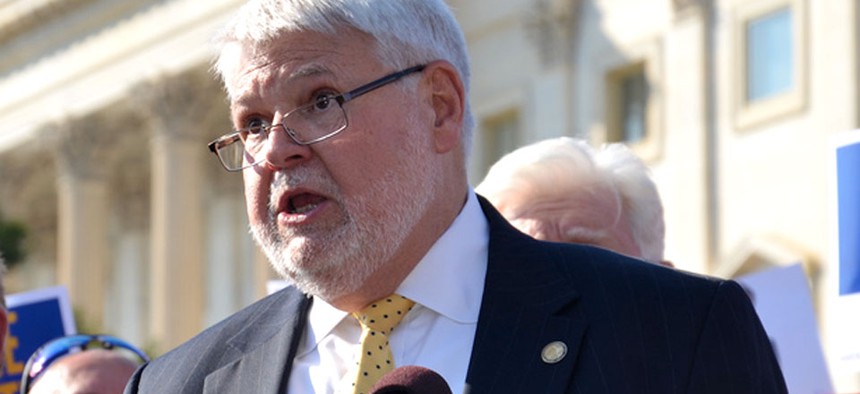
AFGE’s National President J. David Cox AFGE
Fed Groups Offer Tepid Praise for Obama’s Budget
Federal employee advocates applaud funding boosts, but deride 1 percent raise proposal.
Federal employee groups largely supported President Obama’s fiscal 2015 budget recommendation, though they once again criticized his proposed 1 percent pay raise to all civilian workers.
Obama eliminated cuts aimed at federal employees that he had included in previous budgets -- including a pension contribution hike -- and asked for $56 billion more for agencies than what Congress has slated to fund. The president praised the federal workforce in his budget, released Tuesday, and recommended new funding for training, recruiting and retention programs.
“The president’s budget puts shared prosperity ahead of crippling austerity by raising the minimum wage, investing in public infrastructure projects, closing tax loopholes that benefit millionaires and billionaires, and investing in federal programs that will create jobs and expand opportunity,” said American Federation of Government Employees National President J. David Cox Sr.
National Treasury Employees Union President Colleen M. Kelley also applauded the overall theme of the president’s proposals, including a repudiation of the so-called chained-Consumer Price Index, which would result in less generous annuities for federal retirees. Kelley also praised what she called much-needed funding boosts to agencies like the Internal Revenue Service, Customs and Border Protection, the Food and Drug Administration and the Securities and Exchange Commission.
However, she joined Cox in blasting the proposed 1 percent raise, echoing their previous calls for a significantly larger pay increase. William R. Dougan, national president of the National Federation of Federal Employees, called the plan -- which Congress can still alter or block altogether -- “woefully insufficient” and said feds are nearing a “tipping point.”
“Following years of unsustainable and extreme budget measures, workers are becoming increasingly unhappy with their federal employment,” Dougan said. “We are reaching the point where we are putting federal agencies at risk of being unable to conduct the business of the American people.”
Joseph Beaudoin, president of the National Active and Retired Federal Employees Association, said federal employees were previously treated as “pawns in the budget game,” but hoped this year’s proposal marked a “first step in reversing this trend.”
As expected, lawmakers were generally divided along party lines, with Democrats supporting the president’s call to further undo sequestration and invest in infrastructure, and Republicans calling the plan irresponsible. One thing appeared clear, however: Congress is very unlikely to heed Obama’s call to boost spending levels to more than it has previously agreed to.
“We have a budget agreement for fiscal year 2015, and the Senate Appropriations Committee will adhere to the spending caps in that deal,” said Sen. Barbara Mikulski, D-Md., chairwoman of the committee.
House Speaker John Boehner, R-Ohio, said the budget would hurt the American economy and cost jobs.
“After years of fiscal and economic mismanagement, the president has offered perhaps his most irresponsible budget yet," Boehner said.
NEXT STORY: TSP Rebounds in February







